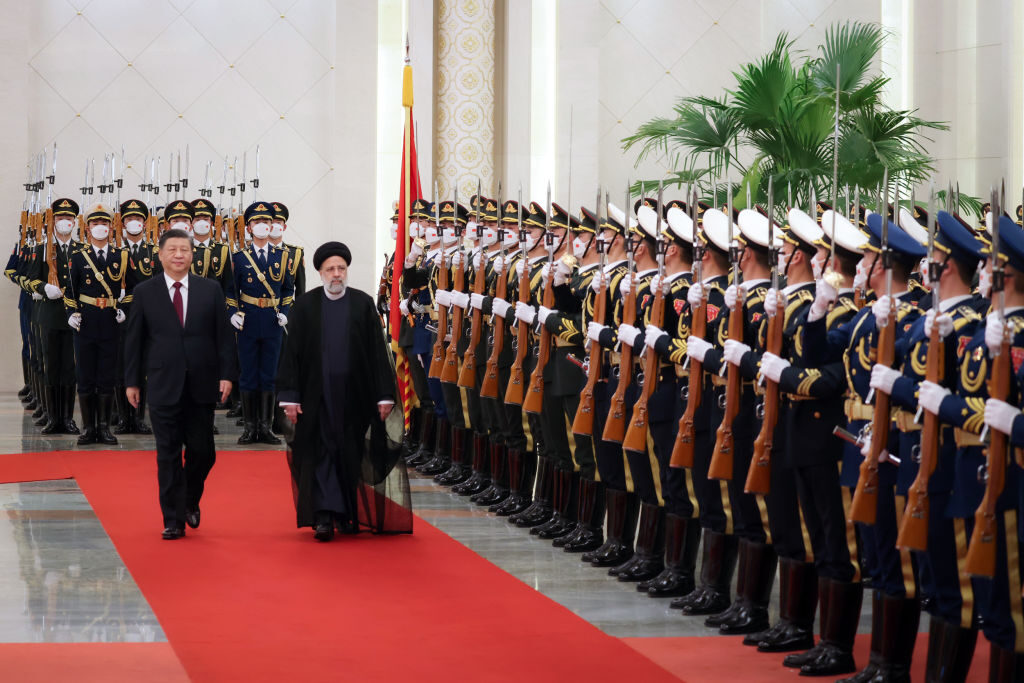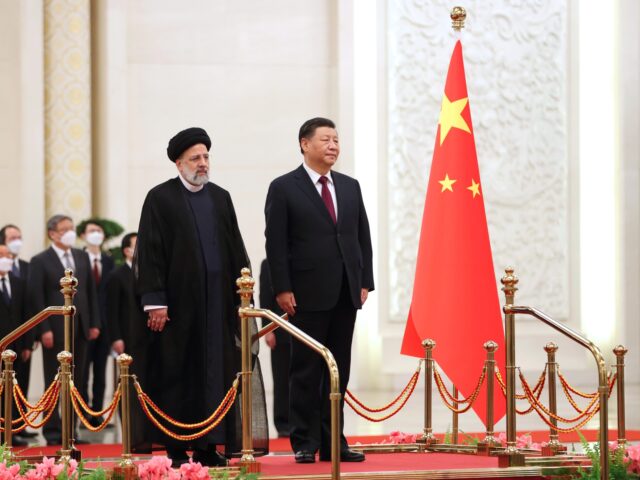Chinese communist dictator Xi Jinping welcomed his Iranian counterpart Ebrahim Raisi to Beijing on Tuesday with a ceremony to sign 20 cooperation documents and a vow that China would help pressure the world to return to the failed 2015 Iran nuclear deal.
Raisi landed in Beijing on Tuesday morning local time for an official visit at Xi’s behest. According to both governments, Xi extended the invitation while meeting with Raisi in Uzbekistan last year for the Shanghai Cooperation Organization (SCO) summit in September. Raisi eagerly accepted as trade volume with China has skyrocketed and their bilateral ties have grown stronger. China has managed to increase its influence over Iran while simultaneously strengthening ties with its top geopolitical rival, Saudi Arabia; Crown Prince Mohammed bin Salman warmly welcomed Xi to Riyadh in December.
Both Iranian and Chinese officials emphasized the importance of Raisi’s visit for economic ties between the two countries but, during remarks on Tuesday, Xi emphasized China’s wise to see the return of the Joint Comprehensive Plan of Action (JCPOA).
“China will continue to constructively participate in the negotiations on resuming Iran’s nuclear agreement,” Xi said while meeting with Raisi. “In the face of the current complex changes in the world, times, and history, China and Iran have supported each other [and] worked together in solidarity and co-operation.”
…promote steady growth of the two countries' comprehensive strategic partnership, and play a positive role for world peace and human progress amid changes unseen in century.
— Hua Chunying 华春莹 (@SpokespersonCHN) February 14, 2023
Xi also reportedly asserted that China rejected “interference” from foreign actors in Iranian affairs, an apparent statement of support for Iran’s ongoing violent crackdown of pro-freedom protesters nationwide. The Iranian Islamist regime has been struggling to suppress an uprising triggered by the brutal killing of 22-year-old Mahsa Amini, who Iranian police beat to death for allegedly wearing her mandatory hijab incorrectly. Iran lost its position on the United Nations’ women’s rights body in response to the Amini incident and hundreds of protesters in the wake of her killing, but has not endured any significant consequences over the affair internationally.
“We oppose external forces interfering in Iran’s domestic affairs and undermining the country’s security and stability, and we intend to continue strong mutual support on key interests,” Xi reportedly said on Tuesday.
The JCPOA, commonly referred to as the Iran nuclear deal, was the top foreign policy achievement of the administration of far-left American President Barack Obama. If adhered to, the Obama White House insisted it would prevent Iran from enriching sufficient uranium to develop a nuclear weapon, a priority for maintaining stability in the region and addressing the security concerns of Israel and Saudi Arabia, American allies.
While the agreement was in vigor, Iran routinely stockpiled Uranium and appeared to violate the deal with announcements of increased enriched uranium quality beyond the limits of the JCPOA. Obama’s negotiating came under heavy criticism during the early days of the JCPOA as news surfaced that America also paid Iran $1.7 billion in cash – to avoid sanctions – presumably indirectly related to negotiations around the agreement. The time period immediately following the cash payment was marked by a prodigious increase in Iran-backed terrorist activity in Iraq, Syria, Lebanon, Yemen, and Latin America.
President Donald Trump withdrew America from the JCPOA in 2018 calling it “decaying and rotten … defective at its core.”

Iranian President Ebrahim Raisi (L) being welcomed by Chinese President Xi Jinping (R) with an official ceremony in Beijing, China on February 14, 2023. (Presidency of Iran / Handout/Anadolu Agency via Getty Images)
Following President Joe Biden’s inauguration, a symbolic return of the Obama era, the Chinese government took the lead in pressuring the new White House to reconsider the JCPOA, which continued to exist in a moribund state thanks to the help of European partners.
“The U.S. should return to the deal unconditionally, and lift all illegal sanctions against Iran and long-arm jurisdiction over a third party,” Chinese ambassador to Tehran Cheng Hua asserted in 2021.
Biden initially expressed interest in returning to the agreement, but America was not welcome to any related negotiations. In one particularly embarrassing episode, the Biden administration invited itself to a meeting of the remaining signatories to the JCPOA – Iran, Britain, China, France, Germany, and Russia – in Vienna, Austria, in April 2021. Biden sent U.S. Special Envoy for Iran Robert Malley to Vienna during that meeting, but Malley stayed in a different hotel than the one where talks were occurring and was not invited to participate or speak with participating representatives, leaving unclear why he had traveled to Austria at all.
China has remained one of the most vocal supporters of the agreement since the Vienna meeting. China’s representative at the United Nations, Wang Chang, insisted in Spetember during a meeting of the International Atomic Energy Agency (IAEA) Board of Governors that Iran has “reasonable demands” that must be met with an “early agreement” to restore JCPOA talks. That same week, Xi met with Raisi in Uzbekistan.
In addition to remarks in support of the Iran nuclear deal, Xi’s and Raisi’s teams signed 20 memoranda of understanding during their meeting, according to Iranian state outlet Fars News.
“According to the documents, Tehran and Beijing will improve cooperation in different sectors,” Fars News reported, “including crisis management, tourism, communication and information technology, the environment, international trade, intellectual property, agriculture, exports, healthcare, media, sports and cultural heritage.”
President Rayeesi Receives Official Welcome from President Xihttps://t.co/myCYQa6P5n pic.twitter.com/C1ms8yTmqh
— Fars News Agency (@EnglishFars) February 14, 2023
Economic cooperation appears to be high on the agenda for both Raisi and Xi. Accompanying Raisi to Beijing are Iran’s top oil and mining ministers, a sign that the two countries will discuss purchases of sanctioned Iranian oil. Malley, Biden’s top Iran official, described China in January as “the main destination of illicit exports by Iran.”
A Bloomberg News report that month suggested that China may be receiving Iranian oil imports through Malaysia, which appears on paper to be selling China more oil than it can realistically produce.

COMMENTS
Please let us know if you're having issues with commenting.